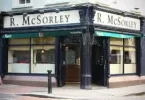The rise of the Zombie Pub
@font-face { font-family: "Cambria"; }@font-face { font-family: "Lucida Bright"; }p.MsoNormal, li.MsoNormal, div.MsoNormal { margin: 0cm 0cm 10pt; font-size: 12pt; font-family: "Times New Roman"; }div.Section1 { page: Section1; }
The ongoing recession has put a number of pubs and pub groups out of business and into Receivership. But these Receiverships appear to be of indefinite duration and the longer some of them go on, the more they seem to threaten the profitability and capital values of the wider pub trade in Dublin.
The Dublin licensed trade has expressed concern about the manner in which some Receiverships have been handled, questioning the expertise of the accountants and receivers to run pubs over periods of time and questioning the “mixed results” achieved by certain operators put in on behalf of some banks/Receivers.
To a bank-appointed Receiver, simply closing down a pub seldom presents itself as a viable option. The pub’s regular business dissipates and the asset thus devalues considerably before the happy day a buyer can be found.
Disposal delays
The lack of liquidity in the banking system has only complicated disposals where banks find themselves unable to write-off debt to reflect current market values. Neither can they fund a new purchaser. Added to this, the decline in turnover throughout the licensed trade over the past four to five years has had a knock-on effect on value.
Since the market has changed, mistakes have been made.
In some cases these mistakes have led to pubs being leased out to operators either unskilled in the licensed trade or who’re in it for the ‘quick kill’.
One of the first things a Zombie Pub will do is to drop the price of the pint to “unrealistic levels”, levels that simply cannot be sustained in the opinion of most long-serving publicans in the trade.
And up against bargain basement prices for a pint from such pubs, surrounding vintners claim that they’re doing huge harm to the genuine trade in the vicinity.
Publicans who’ve invested heavily in their premises as the way forward find themselves losing customers in what they describe as a “race to the bottom”.
As much as 20 to 30 per cent of their customers have migrated to pubs operating in the €2-a-pint market, they claim.
“After spending most of the evening there, customers might come back to their local for one pint at the end of the night,” complained one affected publican, “It’s taking the good fabric out of a really good pub and damaging a lot of really good publicans out there.”
It seems ironic that through the €2-a-pint pub, the value of the bank’s asset continues on its downward journey at the very time that the bank’s agents seek a buyer – a buyer who’ll ultimately have to rebuild the value and goodwill lost.
Such low prices – heavily promoted as the pubs’ best asset – only lead to cuts in expenditure on the pub itself. As a result, these premises tend to become a magnet for the ‘wrong’ type of customer.
“The quality of customer goes down the tubes and the pubs in question finish up on the decks,” explained one publican affected by one Zombie Pub, “It can take just three to six months to destroy a decent pub but it can take six years to get it back up again.”
By way of example, he cited one particular Dublin establishment opening at 10.30am and offering pints at €3.20 right through to 9pm seven days a week.
“If a person owns a house, they do it up and reinvest in it. With leasing, someone comes in and it’s not their property and they’re simply paying the rent. With these pubs, the lessee’s objective is to make as much as possible in a short time and then get out.”
While few in number in Dublin at present, such pubs are doing “untold damage”, agreed another publican who’s doubly offended by his own bank’s insistence that he continue to pay his mortgage in full “… while at the same time they’re allowing this type of management appointed by their Receiver to run the pub next door to me!
“These pubs are doing damage to the genuine operators and bringing down the base of the trade as a whole.”
But the mistakes made initially are slowly being learned and a good Receiver has learned the value of installing a good operator.
Anyway, cheap pint pubs are not limited to some pubs in Receivership.
Apparently viable premises dabble in this price practice too. With increasing numbers of Receiverships looming on the 2011 horizon, could this situation deteriorate?
Communications breakdown
And all does not appear well on the other side of the Receiver’s desk either.
Communications failures, arrogance and incompetence appear to have dogged the ground that lies between some banks, their Receivers, the lessees and those charged with disposing of properties.
“It’s mostly the same people running the ‘surviving’ banks today as ran them five years ago,” claimed one trade source.
In an attempt to countermand this drift towards increasing numbers of Receiver-run pubs, the LVA sent a letter to the six major banks just over a year ago. The letter emphasised their concerns.
While Dublin vintners understood the harsh reality of the current economic environment, the letter pointed out that some Receiverships appeared to be running on indefinitely.
The LVA questioned the expertise of the accountants and Receivers to run these pubs over an extended period, destroying the turnover and profits of the pubs in question, ultimately severely reducing the capital value of these pubs, it claimed.
In turn, this was having a negative influence on the wider pub trade – and on the banks’ investment, claimed the Association which favoured a more rapid conclusion to ongoing Receiverships.
However the banks (reeling from the banking crises and with many of their senior executives fearing for their own positions) were in no mood to be lectured to in what they considered an aggressive and negative missive from Dublin publicans.
After all, few had made any genuine offers for the pubs in question, it was claimed. How could they afford to with no loan availability, it was counterclaimed.
Perhaps the LVA’s letter could have been couched more positively for bruised banking egos. But in the end, it appears to have been ignored.
The mistakes continue. The Receiverships go on. And the licensed trade continues to suffer further declines in customers and capital value.








